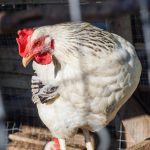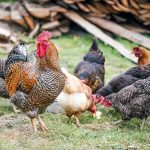Silkies are a distinctive breed of chicken characterized by their soft, fluffy plumage, docile nature, and unique appearance. Often referred to as the “lap dogs” of chickens due to their friendly temperament, Silkies possess several unusual physical traits, including black skin, blue earlobes, and five toes on each foot. These birds are popular among poultry enthusiasts for their ornamental value and their proficiency in hatching and raising chicks.
Chickens, broadly speaking, are domesticated fowl raised for meat, eggs, and feathers. They encompass numerous breeds, each with distinct characteristics. Chickens are generally social, intelligent animals capable of foraging for food.
They play a significant role in sustainable agriculture and small-scale farming. Both Silkies and other chicken breeds are valued by humans as pets, food sources, and subjects of interest for observation and care.
Table of Contents
- 1 Reasons for Keeping Silkies Separate from Chickens
- 2 Potential Health Risks for Silkies in Mixed Flocks
- 3 Behavioral Differences Between Silkies and Chickens
- 4 How to Keep Silkies Separate from Chickens
- 5 Benefits of Keeping Silkies Separate
- 6 Conclusion and Final Tips for Keeping Silkies Away from Chickens
- 7 FAQs
Key Takeaways
- Silkies are a unique breed of chicken known for their fluffy feathers and gentle nature
- Keeping Silkies separate from other chickens can prevent bullying and injury
- Silkies are more susceptible to respiratory diseases and need protection from aggressive pecking
- Silkies have different social behaviors and may not integrate well with other chicken breeds
- Providing a separate coop and run for Silkies can ensure their safety and well-being
- Keeping Silkies separate can reduce stress and improve their overall health
- Consider the needs and behaviors of Silkies when planning their living arrangements
Reasons for Keeping Silkies Separate from Chickens
Vulnerability to Aggression and Bullying
As a bantam breed, Silkies are smaller in size compared to standard chicken breeds. This size difference makes them more vulnerable to aggression and bullying from larger chickens. In a mixed flock, Silkies may struggle to compete for food, water, and space, leading to stress and potential health issues.
Unique Physical Characteristics
Silkies have distinct physical characteristics that set them apart from other chicken breeds. Their fluffy plumage and gentle nature make them more susceptible to injury and predation. When housed with other chickens, Silkies may be at risk of being pecked or injured by more aggressive breeds.
Providing a Safe and Secure Environment
By keeping Silkies separate, owners can provide them with a safe and secure environment where they can flourish without the risk of harm from other birds. This allows Silkies to thrive in an environment tailored to their specific needs, ensuring they can live a happy and healthy life.
Potential Health Risks for Silkies in Mixed Flocks

When Silkies are kept in mixed flocks with other chicken breeds, there are several potential health risks that owners should be aware of. One of the main concerns is the spread of diseases and parasites. Different chicken breeds may have varying levels of resistance to certain diseases, and introducing Silkies into a mixed flock can increase the risk of disease transmission.
Additionally, parasites such as mites and lice can easily spread among birds in close proximity, leading to discomfort and potential health issues for Silkies. Another health risk for Silkies in mixed flocks is the potential for injury and stress. As mentioned earlier, Silkies are smaller and more delicate compared to standard chicken breeds.
When housed with larger and more aggressive birds, Silkies may be at risk of being pecked, bullied, or injured. This can lead to stress-related health problems and decreased overall well-being for the Silkies. By keeping Silkies separate from other chickens, owners can minimize the risk of disease transmission and physical harm, thus promoting the health and longevity of their beloved birds.
Behavioral Differences Between Silkies and Chickens
Silkies and chickens have distinct behavioral differences that make it important to keep them separate. Silkies are known for their gentle and docile nature, often preferring to avoid confrontation and conflict. They are also known for their broody behavior, making them excellent mothers who will diligently sit on eggs to hatch and raise chicks.
On the other hand, chickens can exhibit more assertive and dominant behaviors, especially when establishing a pecking order within a flock. This difference in behavior can lead to potential conflicts and stress when Silkies are housed with other chicken breeds. Additionally, Silkies have unique social dynamics that may not align with those of other chicken breeds.
They tend to form close-knit groups within their own breed and may struggle to integrate into established flocks of standard chickens. This can lead to social isolation and potential bullying within a mixed flock. By keeping Silkies separate from other chickens, owners can ensure that their birds can thrive in an environment that is conducive to their specific behavioral needs.
How to Keep Silkies Separate from Chickens
There are several strategies that owners can use to keep Silkies separate from other chicken breeds. One option is to provide separate housing for the Silkies, either in a dedicated coop or within a partitioned area of the existing coop. This allows Silkies to have their own space where they can feel safe and secure without the risk of aggression or bullying from other birds.
Owners can also consider using temporary fencing or netting to create a designated area for the Silkies to free-range without coming into direct contact with other chickens. Another approach is to keep Silkies in a separate run or enclosure that is physically separated from the main chicken flock. This can be achieved by using wire mesh or netting to create a barrier between the two groups of birds.
By keeping Silkies in a separate area, owners can ensure that they have access to food, water, and shelter without the risk of competition or conflict with other chickens.
Benefits of Keeping Silkies Separate

Customized Environment for Optimal Well-being
By keeping Silkies separate, owners can provide a tailored environment that meets their specific needs, including their smaller size, gentle nature, and unique social dynamics. This can lead to improved overall well-being for the Silkies, resulting in better health, behavior, and productivity.
Reduced Risk of Disease and Harm
Separating Silkies from other chickens reduces the risk of disease transmission and physical harm, promoting the health and longevity of the birds. By minimizing the potential for stress, injury, and conflict, owners can ensure that their Silkies thrive in a safe and secure environment.
Improved Monitoring and Personalized Care
Keeping Silkies separate allows owners to better monitor the health, behavior, and productivity of their birds. This leads to improved management practices and more personalized care for the Silkies, ultimately resulting in a more rewarding experience for both the birds and their owners.
Conclusion and Final Tips for Keeping Silkies Away from Chickens
In conclusion, keeping Silkies separate from other chicken breeds is essential for ensuring the health, well-being, and productivity of these unique birds. By providing a safe and secure environment that meets the specific needs of Silkies, owners can promote better overall outcomes for their birds. Whether through separate housing, designated enclosures, or temporary fencing, there are various strategies that owners can use to keep Silkies away from other chickens.
Final tips for keeping Silkies separate include regular monitoring of the birds’ health and behavior, providing enrichment activities to prevent boredom and stress, and seeking advice from experienced poultry professionals when needed. By taking proactive measures to keep Silkies separate from other chickens, owners can create a positive environment where these charming birds can thrive and flourish.
If you’re looking for ways to keep silkies away from your chickens, you may want to consider renting a chicken coop. According to Poultry Wizard, having a separate coop for silkies can help prevent them from causing any harm to your other chickens. Check out their article on renting a chicken coop for more information on this solution.
FAQs
What are silkies and why should they be kept away from chickens?
Silkies are a breed of chicken known for their fluffy plumage and gentle nature. They should be kept away from other chickens because they are often smaller and more docile, making them vulnerable to bullying and aggression from larger, more dominant breeds.
What are the potential risks of keeping silkies with other chickens?
Keeping silkies with other chickens can result in bullying, pecking, and injury to the silkies due to their smaller size and gentle nature. Additionally, silkies may struggle to compete for food and resources, leading to malnutrition and stress.
How can silkies be kept separate from other chickens?
Silkies can be kept separate from other chickens by providing them with their own separate coop and run. This will ensure that they have their own space and are not at risk of being bullied or injured by other breeds.
Are there any benefits to keeping silkies separate from other chickens?
Keeping silkies separate from other chickens can help to ensure their safety and well-being. It can also prevent unnecessary stress and aggression within the flock, leading to a more harmonious and peaceful living environment for all the birds.
Meet Walter, the feathered-friend fanatic of Florida! Nestled in the sunshine state, Walter struts through life with his feathered companions, clucking his way to happiness. With a coop that’s fancier than a five-star hotel, he’s the Don Juan of the chicken world. When he’s not teaching his hens to do the cha-cha, you’ll find him in a heated debate with his prized rooster, Sir Clucks-a-Lot. Walter’s poultry passion is no yolk; he’s the sunny-side-up guy you never knew you needed in your flock of friends!







